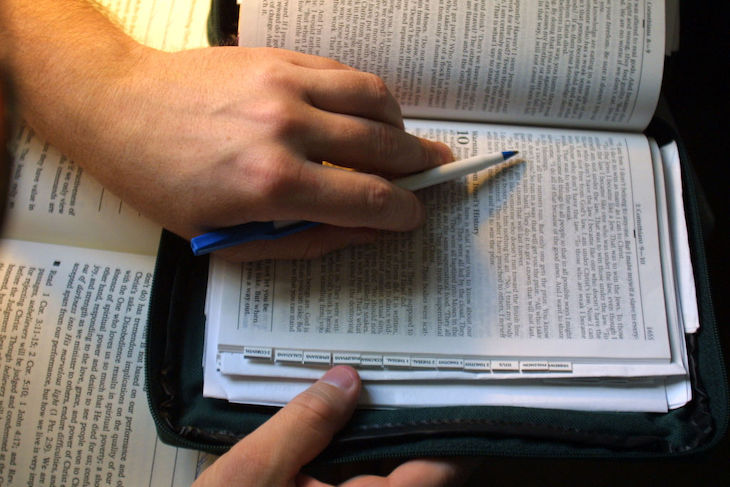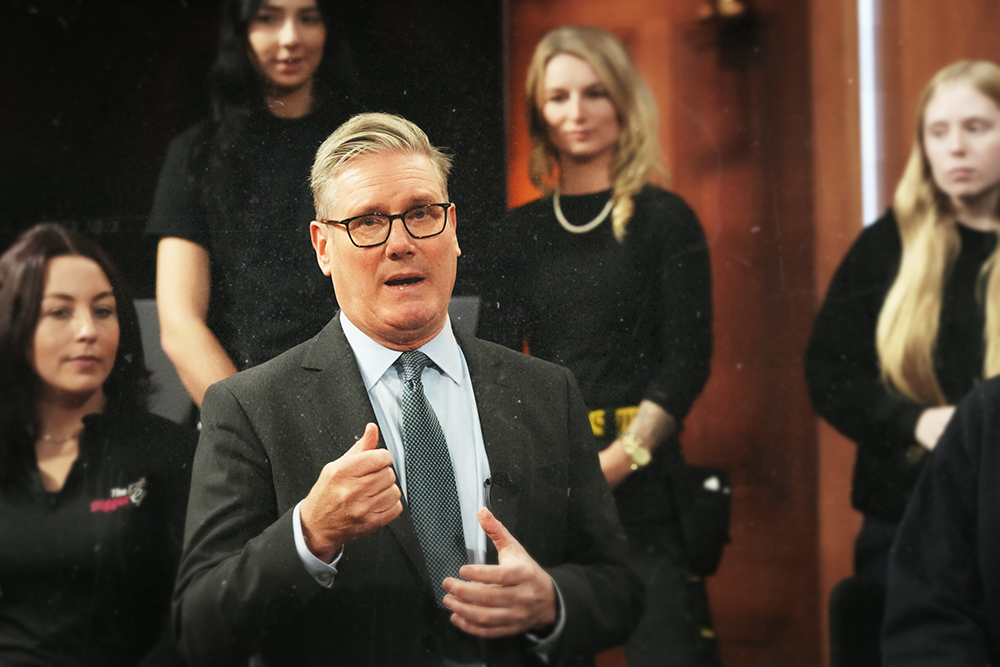Schools in Northern Ireland which teach pupils that Christianity is true are breaking the law. That is the ruling of the Supreme Court, which finds that religious education lessons and collective worship which aren’t ‘objective, critical and pluralistic’ are a form of ‘indoctrination’. It also finds that allowing parents to withdraw their children from these activities, which is already a statutory right, is not enough because doing so might place an ‘undue burden’ on parents or stigmatise the child.
By its very nature, Christianity is an absolute truth claim: Jesus of Nazareth was the Son of God who died for our sins
The case involves a girl who, between 2017 and 2021, attended a ‘controlled’ school, a non-denominational institution overseen by a board of governors, funded by the Education Authority, and historically serving Northern Ireland’s Protestants. The girl’s parents are humanists and don’t wish their child, who is now 11, to be raised a Christian. While they profess to have no issue with religious education, they opposed their daughter being taught the tenets of Christianity as objective truths.
They want to teach her instead to be ‘caring, ethical and respectful of all people’. However, they decided not to withdraw her from religious lessons and worship because they feared she would be ‘bullied or isolated’, would interpret her exclusion as a punishment, and would be ‘outed, school year by school year, as a non-Christian’.
Instead, the father contended that the school’s religious curriculum and collective worship should change. He considered it in contravention of Articles 2 and 9 of the European Convention on Human Rights. Article 2, Protocol 1 says the state must respect parents’ rights to ensure their child’s education is ‘in conformity with their own religious and philosophical convictions’. Article 9 guarantees freedom of thought, conscience and religion. The father fired off a complaint to the school, which responded that it provided ‘Bible-based’ religious instruction in line with Northern Irish law.
In 2022, the High Court ruled in favour of the father, finding that the school’s teaching and worship were not delivered in an ‘objective, critical and pluralistic manner’ and that the parental right of withdrawal was insufficient because it could impose an ‘undue burden’, parents might be ‘deterred’ from seeking exclusion, and withdrawal brought the risk of stigmatisation.
In 2024, the Court of Appeal upheld the lower court on the first point but disagreed on the second: the right of withdrawal remedied the problem. The Supreme Court has concluded otherwise and on Wednesday handed down a judgment declaring that teaching children about religion in a way that is not ‘objective, critical and pluralistic’ amounts to ‘indoctrination’.
By way of evidence, the justices highlight a number of concepts from the curriculum. In the Foundation Stage core syllabus, teachers are encouraged to ‘provide opportunities for pupils to appreciate’ that ‘praying is a way of talking to God so that we can thank him, praise him, say sorry and ask for help’. At Key Stage 1, they are directed to help pupils ‘understand that the God who loves them is forgiving towards them and that they should be forgiving towards others’. The Key Stage 2 syllabus tasks teachers with urging pupils to ‘consider the respect due to creation, which is the gift of God’.
The Court concludes that:
‘[T]he core syllabus encourages pupils faithfully to accept the existence of the Christian God, to accept that good things come from the Christian God, that the Christian God can help in times of adversity and that morality is based upon, and derived from, the existence of the Christian God.’
It has also decided that allowing parents to withdraw their children from these lessons doesn’t resolve the breach because, at this school, the process was capable of creating an undue burden on parents.
Lord Stephens, author of the judgment, is keen to stress that the ruling is narrow. It doesn’t say religious education is banned nor that Christianity shouldn’t be the main faith schoolchildren learn about. It doesn’t undermine parents’ rights to inculcate religious principles in their offspring, nor the education department’s right to set the religious education curriculum, nor the place of Christianity in school-based collective worship.
As a layman, I defer to the learned justice and his colleagues, though I am tempted to add one word to his litany of reassurances: ‘Yet’. While I’m happy to leave the law to the lawyers, there is a cultural point to be made. The current arrangements in Northern Irish education arose out of the post-Partition entry of the state into the provision of education. In exchange for handing over their schools, Protestants were guaranteed funding and the right to continue educating their children in the Christian faith.
Northern Ireland’s history means that the religious curriculum in ‘controlled’ schools doesn’t prioritise any one Christian denomination and instead teaches Christianity in general terms using a syllabus agreed by the main Protestant churches. It is a consensus curriculum that deliberately avoids areas of doctrinal controversy. A devout Christian might even call it inoffensive Christianity.
Yet even this lukewarm gospel is too fiery, and now the Northern Ireland education department will have to reconsider its curriculum and how it is taught in schools. It might also have to reconsider the role of the churches in the process, since Lord Stephens identifies the curriculum’s lack of objectivity and pluralism as ‘the inevitable consequence of leaving the drafting of the core syllabus to the four main churches’, which ‘seek to promote faith in Christianity’.
This is a story about teaching materials in a Northern Ireland school, but it’s a story about a great deal more than that
The inevitable consequence of this judgment will be the weakening of Christian instruction and worship in Northern Ireland schools. By its very nature, Christianity is an absolute truth claim: Jesus of Nazareth was the Son of God who died for our sins. To teach Christianity is to teach the objective and eternal truth of salvation through Christ; to teach that this is merely one of many religious viewpoints is to teach about Christianity. The former is religious education in the true sense: the cultivation of a Christian soul through doctrinal instruction, spiritual reflection, and a wider school ethos. The latter is a mere academic exercise in comparative religious studies.
There are those who would welcome any diminution in the role of religion in education, not least in Northern Ireland where religious identity – though not, I would argue, religious belief and practice – has been a source of bloody division. Even so, the continued erosion of public Christianity is nothing to celebrate. Broadly speaking, nations are either creatures of ideas or creatures of history and Northern Ireland, like the rest of the UK, is a creature of history. It is impossible to separate that history from Christianity and its foundational, cultural, and civilisational import, an import which reaches beyond the past to today and tomorrow. The sharp decline in religiosity does not justify further marginalisation of Christianity, but it should give pause for reflection. Northern Ireland cannot discard its formative Christian heritage without disturbing the customs, attitudes and conventions which rest on it. In cultural terms that heritage is a load-bearing wall. Sledgehammer away at your peril.
When a nation rejects its history it is embarking, consciously or otherwise on a new founding, and since the basis of that founding can’t be history, it will have to be ideas. The Northern Irish need only look south to see how the refounding of the Irish republic is going. Having shed almost every vestige of its Catholic heritage, Ireland is a nation in search of a replacement dogma and its elites lurch from one successor gospel to another, from multiculturalism to transgenderism, all the while scolding an increasingly impatient populous to accept that things have always been this way and only a bigot would disagree.
This is a story about teaching materials in a Northern Ireland school, but it’s a story about a great deal more than that.








Comments